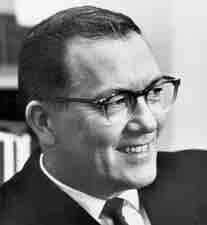The Landrum-Griffin Act
The Labor Management Reporting and Disclosure Act of 1959 (also "LMRDA" of the "Landrum-Griffin Act"), is a United States labor law that regulates labor unions' internal affairs and their officials' relationships with employers. It was sponsored by Democrat Phil Landrum and Republican Robert P. Griffin.
History and Background
After passage of the Taft-Hartley Act, the number of union victories in NLRB-conducted elections declined. During the 12-year administration of the Wagner Act, unions won victories in over 80 percent of elections. But in that first year after passage of the Taft-Hartley Act, unions only won around 70 percent of the representation elections conducted by the agency.
During the middle and late 1950s, the labor movement was under intense Congressional scrutiny for corruption, racketeering, and other misconduct. Enacted in 1959 after revelations of corruption and undemocratic practices in the International Brotherhood of Teamsters, International Longshoremen's Association, United Mine Workers and other unions received wide public attention, the Act required unions to hold secret elections for local union offices on a regular basis, and provided for review by the United States Department of Labor of union members' claims of improper election activity. Organized labor opposed the act because it strengthened the Taft-Hartley Act of 1947.
Provisions
Important provisions of the law were as follows:
- Unions had to hold secret elections, reviewable by the Department of Labor.
- Union members are protected against abuses by a bill of rights that includes guarantees of freedom of speech and periodic secret elections of officers.
- Bar members of the Communist Party and convicted felons from holding union office.
- Require unions to submit annual financial reports to the DOL.
- Declare that every union officer must act as a fiduciary in handling the assets and conducting the affairs of the union.
- Limit the power of unions to put subordinate bodies in trusteeship, a temporary suspension of democratic processes within a union.
- Provide certain minimum standards before a union may expel or take other disciplinary action against a member of the union.
Amendment to the National Labor Relations Act
Congress also amended the National Labor Relations Act, as part of the same piece of legislation that created the LMRDA, by tightening the Taft-Hartley Act's prohibitions against secondary boycotts, prohibiting certain types of "hot cargo" agreements, under which an employer agreed to cease doing business with other employers, and empowering the General Counsel of the National Labor Relations Board to seek an injunction against a union that engages in recognitional picketing of an employer for more than thirty days without filing a petition for representation with the NLRB.
Consequences and Results
While intended largely to limit union corruption and create a more equitable power structure within the unions, the Act was not without flaws in this regard. Twenty years after the passage of the Act, co-sponsor Senator Robert Griffin extolled its success in writing, saying: "Today, nearly two decades after enactment, it is undeniable that the Landrum-Griffin Act has played a significant role in enabling union members to participate more freely in the affairs of their unions. On the other hand, it cannot be said that union corruption and abuses of union power have disappeared. But such conduct in the union movement is not as common as it was twenty years ago; and, in large measure, that can be credited to the existence of the Landrum-Griffin Act. " Senator Griffin acknowledged the shortcomings, particularly with regard to the Teamsters. However, Griffin argued that these violations were contrary to the Act, placing the blame instead on the Department of Labor for failing to pursue action against the Teamsters union for its corruptions.
Ultimately, the act's technical failures were exploited by both the courts and union officials—most famously the Teamsters, whose president, Jimmy Hoffa, among others, notably raided the union pension coffers for his own personal investments. While the Act ostensibly was created to foster democracy, the judiciary frequently interpreted it in ways to minimize internal union dissonance and labor disruption, favoring instead the stern hand of management. As law professor Alan Hyde put it: "Indeed, the courts advance democratic bargaining only when assured that such democracy will not disadvantage more fundamental policy interests, such as harmony between employers and "unions" (read union elites) or control of inflation. "

Republican Senator Robert P. Griffin
Co-sponsor of the Landrum-Griffin Act.